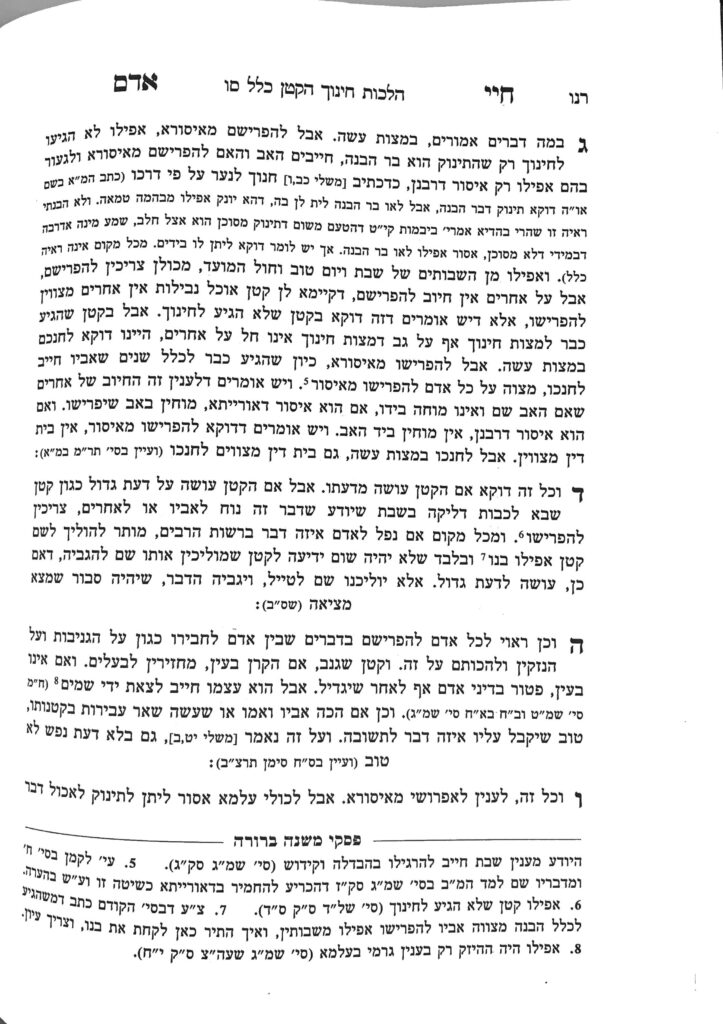We are continuing in siman 3, where the Chayei Adam discusses mitzvos lo saasei. The Chayei Adam brought several opinions regarding whether there is a chiyuv on other adults to stop a child from transgressing a mitzvas lo saasei. The Chayei Adam’s final psak is that once a child reaches the age of six or seven, the chiyuv chinuch extends beyond the father to other members of Klal Yisroel if the child is transgressing a mitzvas lo saasei on a deoraysa level. However, the chiyuv chinuch does not extend beyond the father in any other circumstance. Today, we will discuss the opinion which holds that others are chayav to protest against a mitzvas asei that the child is not fulfilling, but not against mitzvos lo saasei.
The Chayei Adam brings an opinion which holds that others are chayav to protest against a mitzvas asei that the child is not fulfilling, but not against any mitzvos lo saasei. The source for this opinion is in hilchos sukkah, in siman 640:2. There, the Shulchan Aruch writes that when a child no longer needs his mother, there is a chiyuv for him to sit in the sukkah (see shiur 1270). The Magen Avraham, as quoted by the Mishnah Berurah (sk 5), writes that if there is no father, the mother and beis din are responsible to be mechaneich the child. Although not completely comparable, we see from here a concept that when a child will not fulfill a mitzvas asei, beis din is responsible to step in and help the child fulfill it, because beis din is considered avihem shel yesomim, the father of the yesomim (in the language of the Gemara). If the mother is able to be mechaneich the child, we have learned (shiur 1268) that she would be responsible for the chinuch.
The Chayei Adam references this halacha because we see from here the concept of beis din (i.e., others besides for the father) stepping in to ensure a child is fulfilling mitzvos asei. We can infer from here that beis din (i.e., others besides for the father) would not be responsible to ensure a child does not transgress mitzvos lo saasei, for if they were, they would be responsible even when the father is still alive.
We have mentioned (1262) that the highest level of responsibility towards a child is not to directly cause them to do an issur. This issur applies even to a newborn. The Mishnah Berurah raises the question about feeding a child outside of a sukkah on Sukkos. Although there is nothing assur about the food, per se, but eating out of the Sukkah is a lack of chinuch, so although a parent may not be chayav to bring the child to the sukkah, maybe they should not be allowed to actively feed the child outside of it. The Mishnah Berurah concludes that actively feeding a child over the age of chinuch outside of the sukkah is assur. However, before the age of chinuch, since there is no mitzvah for the child to sit in the sukkah, there is no issur to actively feed the child outside of the sukkah. Although food which is assur cannot be fed to even a newborn, over here, the issue is not the food but undermining the mitzvah of chinuch. Since the mitzvah of chinuch does not apply to a child under the age of chinuch, one is not undermining anything by feeding the child outside of the sukkah.
On the other hand, we learn from here that in any situation where a child is above the age of chinuch, although we pasken that a others do not have to compel a child to fulfill a mitzvas asei or mitzvas lo saasei on a derabanan level, they cannot actively help them avoid it, because they are actively undermining the chiyuv chinuch. This issur applies to others instructing the child as well, and applies to just instructing the child to eat even if not actively feeding them. However, if one places the food in front of the child, and the child eats on their own, it would not be an issur for others. It would be an issur for the father, because he still has a positive chiyuv chinuch, which he is directly undermining by placing the food in front of the child.
Summary
The Chayei Adam holds that once a child reaches the age of six or seven, the chiyuv chinuch extends beyond the father to other members of Klal Yisroel if the child is transgressing a mitzvas lo saasei on a deoraysa level. However, the chiyuv chinuch does not extend beyond the father in any other circumstance
Even so, the father and others are not allowed to actively feed a child issur, from any age. Thus, regarding sitting in a sukkah, once a child is old enough to be obligated in the mitzvah of sukkah,
the father cannot directly or indirectly feed a child outside of the sukkah, because they are directly undermining their mitzvas chinuch.
However, others may not directly feed the child outside of the sukkah, thereby undermining the chiyuv chinuch of the father. They may indirectly feed the child, because they are not directly undermining the chiyuv chinuch of the father.
Others may not tell a child to eat outside of the sukkah, as that is considered directly undermining the chiyuv chinuch. They may place the food in front of the child and the child will decide on his own if he wishes to eat.
Similarly, this issur does not apply to a child under the age of chinuch (even for their father), for there is no mitzvas chinuch to undermine by feeding them outside of the sukkah.
.



